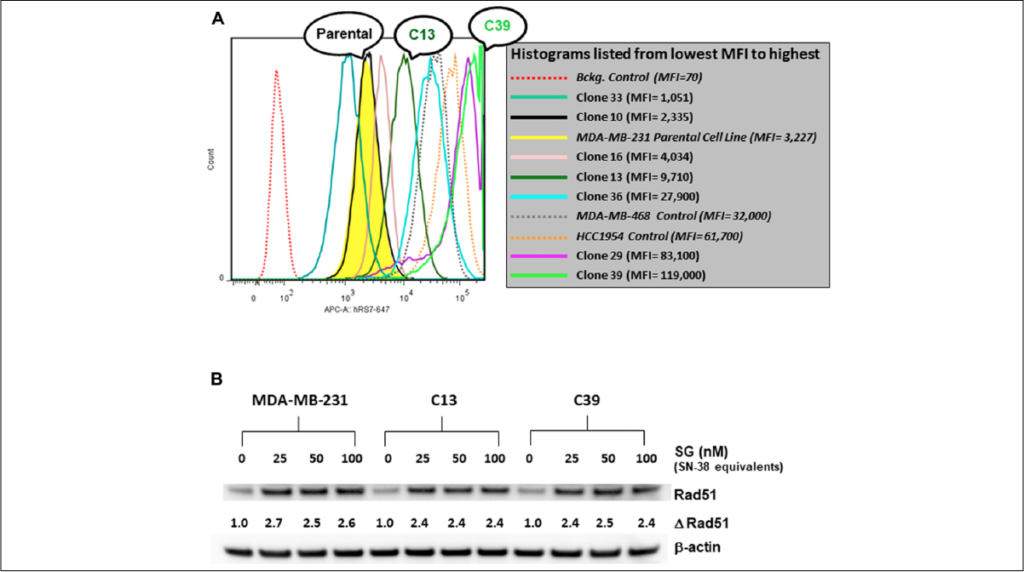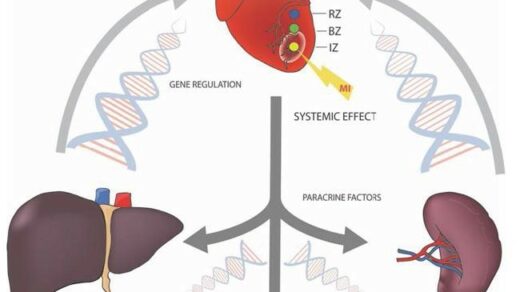In this 2020 paper, researchers searched for biomarkers of sacituzumab govitecan treatment efficacy in triple-negative breast cancer.

The Top-Performer series highlights research literature published by Oncotarget that has generated a high Altmetric score. Altmetric scores, located at the top-left of trending Oncotarget papers, provide an at-a-glance indication of the volume and type of online attention the research has received.
Read Oncotarget’s Top 100 Altmetric papers.
—
Biomarkers are any measurement in the body that can indicate disease, infection, or effects of the environment. These indicators are commonly used to reveal disease, but they can also be used to support personalized cancer therapy.
“In recent years, there has been an increased focus on personalized cancer therapy [1]. One important aspect is the identification of key biomarkers that support a given treatment plan [1–5].”
Multiple biomarkers have been identified in breast cancers as helpful tools to guide targeted therapies, including the expression of HER2 and estrogen and progesterone receptors. In triple-negative breast cancer (TNBC), a number of distinct biomarkers have given rise to new targeted therapies, such as EGFR antibodies, AKT inhibitors, and PARP inhibitors.
In a well-read paper from Immunomedics, Inc. (recently acquired by Gilead Sciences, Inc.), researchers analyzed sacituzumab govitecan (SG; Trodelvy™) in TNBC. The team authored a research paper that was published by Oncotarget in 2020, and entitled, “Predictive biomarkers for sacituzumab govitecan efficacy in Trop-2-expressing triple-negative breast cancer.” To date, this paper has scored an Altmetric Attention score of 48.
“Here we examined the potential role of biomarkers in predicting the efficacy of SG.”
The Study
Sacituzumab govitecan is an antibody-drug conjugate that targets human trophoblast cell-surface antigen-2 (Trop-2)ーwhich is a glycoprotein that is commonly overexpressed in many solid tumor types.
“Trop-2 is a 46 KDa transmembrane glycoprotein that is overexpressed on many solid tumor types and is correlated with an overall poor prognosis in patients, making it an attractive target for therapy [7, 9].”
The researchers examined a highly invasive and aggressive TNBC cell line (MDA-MB-231), which is not responsive to SG, and compared their findings to TNBC cell lines that are responsive to SG. Their goal was to determine how Trop-2 expression and the homologous recombination repair (HRR) pathway (through Rad51 expression) play roles in protecting the MDA-MB-231 cell line from SG mediated DNA damage.
Trop-2 expression in transfected MDA-MB-231 and tumor xenografts were assessed, in vitro and in vivo Rad51 expression and DNA damagewere assessed via western blot, and statistical analysis was carried out for data from in vivo therapy studies.
“Trop-2 expression levels as a positive, primary biomarker and HRR proficiency as a secondary, negative biomarker were assessed in vitro and in vivo.”
Conclusion
Researchers found that high expression of Trop-2 was indeed a primary biomarker of SG efficacy. However, they note that further clinical trials will be needed to examine other secondary biomarkers that may also predict clinical benefit.
“To conclude, these data strongly support the hypothesis that as a biomarker, high surface Trop-2 expression on a patient’s tumor may be predictive of a positive clinical outcome for SG therapy.”
Click here to read the full research paper, published by Oncotarget.
YOU MAY ALSO LIKE: More Oncotarget Videos on LabTube
—
Oncotarget is a unique platform designed to house scientific studies in a journal format that is available for anyone to read—without a paywall making access more difficult. This means information that has the potential to benefit our societies from the inside out can be shared with friends, neighbors, colleagues, and other researchers, far and wide.
For media inquiries, please contact media@impactjournals.com.




